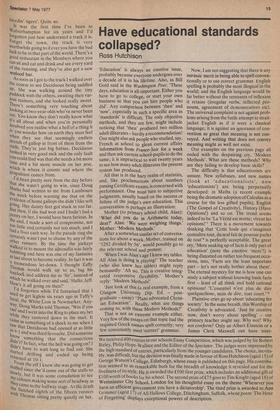Have educational standards collapsed?
Ross Hutchison
'Education' is always an emotive issue, probably because everyone undergoes over a decade of it in his lifetime. Also, as Bill Gold said in the Washington Post: 'These days, education is all-important. Either you have to go to college, or start your own business so that you can hire people who did'. Any comparison between 'then' and 'now', especially in such a specific area as 'standards' is difficult. The only objective methods, and they are few, might include noticing that 'then' produced two million adult illiterates — hardly a recommendation! One might also ask people who studied, say, French at school to glean current affairs 'information from France-Soir for a week and then ask current school-pupils to do the same; it is impractical to wait twenty years to see how many adult illiterates the present system has produced. All that is in the hazy realm of statistics, and, like proclamations about numbers passing Certificate exams, is concerned with performance. One must turn to subjective judgments, usually based on the success or failure of the judge's own education. This conversation is perhaps an illustration:
Mother (to primary school child, Alan): 'What did you do in Arithmetic today, dear?' Alan: 'We were weighing things.' Mother: 'Modern Methods.'
After a somewhat similar set of conversations for about a week, Mother, trained on '5292 divided by 56', would possibly go to the relevant school and protest: 'When I was Alan's age I knew my tables. All Alan is doing is playing!' The teacher (who also knew her tables) might reply bemusedly: `Ah no. This is creative integrated responsive flexibility.' Mother's reply: 'Modern Methods!'
'Just look at this (a real example, from a Glasgow University Dip. Ed. — post
graduate — essay) "Plato advocated Christian Education". Really, what are things coming to, with these Modern Methods?'
That is not an extreme example either. Very few of the essays on that topic had the required Greek names spelt correctly; very few consistently used 'correct' grammar.
Now, I am not suggesting that there is any intrinsic merit in being able to spell conventionally or to use correct grammar. English spelling is probably the most illogical in the world; and the English language would be far better without the remnants of inflexion it retains (irregular verbs, inflected pronouns, agreement of demonstratives etc). The universal complaint is not against problems arising from the futile attempt to straitjacket English as if it were a classical language; it is against an ignorance of convention so great that meaning is not conveyed. And writing that does not convey meaning might as well not exist.
Our examples on the previous page all ended with the despairing cry, 'Modern Methods'. What are these methods? Why are they failing to develop basic skills?
The difficulty is that educationists are unsure. New syllabuses, and new names (look at 'educationalists', now 'educationists') are being perpetually developed: in Maths (a recent example being the dramatic adoption of Calculus as a course for the less gifted pupils), English (The Gospel of Creativity), History (Have Opinions!) and so on. The trend seems indeed to be 'La Write est morte; vivent les opinions!" There is a movement towards thinking that Tette foule qui s'imaginait connaltre tout, du seul fait de pouvoir parler de tout'2 is perfectly acceptable. The great cry, 'Mere soaking upof facts is only part of education' (note the emotive 'mere!) is being distorted on rather too frequent occasions, into, 'Facts are the least important part — let's not really bother about them'. The eternal mystery for me is how one can study a subject witbout knowing basic facts first — least of all think and hold rational opinions! `L'essentiel n'est plus de dire quelquechose, mais de dire, tout court."3
Plaintive cries go up about 'educating for society'. In the same breath, this Worship of Creativity is advocated. 'Just be creative
now, don't worry about spelling' — our primary teacher might say. Why not? Why not conform? Only an Albert Einstein or a James Clerk Maxwell can have inter
mediaries between them and the world doing their explaining for them. Everyone should attempt to make himself understood.
I think this is the respect in which educational standards may be said to have collapsed. It is no longer considered necessary to be comprehensible to others. A purely introspective education is not enough. Solon said 'Know Thyself. That is a very good moral maxim, but a bad educational one.
'Know Thyself And Others' comes close to being a good educational idea. In a perfectly sincere passion for the pupil's interests, it has been easy to forget that, in the society we all live in, everyone has to know not only himself and his own highly creative thoughts, but also how to communicate these thoughts to others in a form they can understand.
'I tired of being teached to play. I want to be teached to learn' (quoted by Robert Sylvester in Chicago Tribune as the despairing cry of a primary schoolchild). This sums up ,another fundamental collapse. In the enthusiasm for devising new 'discovery' syllabuses, it has been tempting to forget that they are being designed for imperfect human teachers just as much as for imperfect human pupils.
What sometimes seems to be forgotten is that pupils and teachers need security and they need goals. Teachers have had any sense of security removed by the invasion of the syllabus-designers; this communicates itself to their pupils. The removal of qualifying exams further deprived teachers and pupils of goals. Teachers no longer feel such an obligation to ensure that their pupils have mastered basic skills. Pupils no longer feel an urge to achieve their best, I believe that only by establishing national minimum gtandards in certain basic subjects (Basic Arithmetic, including mental Arithmetic for when we forget our electronic calculator; and Communication Skills, preferably in two languages) to be tested regularly by examinations, can the collapse in basic standards be put right.
This alone is not the answer. Standards of true education would fall if this were the only purpose. The initial purpose of education must be to provide everyone with the equipment for life's game. This is analogous only to providing a Rugby Ball, or, as Si' Winston Churchill said, 'the tools'. After being given the tools, we must 'get on with the job'. Perhaps thirty years ago, one was considered tO be 'educated' if one possessed the tools. The rush to Creativity pointed out the fundamental error there; it went too far. By simple origin, education is 'leading out each person's talents to the full. If this can be done, then of course 'Reading, 'Riting and 'Rithmetic' are vital. So are facts about a subject. We cannot read Greek without knowing the alphabet. We cannot cover ur our ignorance with `bouchees de mots'.
Education then is not 'social engineering'. It is not rebuilding of society according to some individual's' personal political 1 credo. It is development of each person to his full potential. But it is not making sub.jective judgments about whether cooking Is a more valuable hobby than playing Rugby; or whether Mathematics is a more valuable study than Classical Greek. As soon as preconceived notions about relative 'worth' 0f talents are eliminated, then will education start to become what it should be. As soon as failure in an academic set of exams means only that the 'failure' is not academicalbfr minded and does not brand him a CO pletely useless being in his own mind or others', then non-certificate pupils will n°` have to pretend that they are really certificate pupils after all. This fear of branding anyone a 'failure is the fundamental cause of the collapse in the educational system. Yes, educational standards have collapsed. But yes, everyone is equally, but differently gifted. Let OLIO; tional standards rather strain to rise to nlee the most gifted in every area than collapse to uniform mediocrity. Let Education bde the ennobling, vibrant yes exciting an r exhilarating experience it should be everybody, no matter who he is or how he gifted.
References:
1: Morin, L, Les Charlatans de la Nouvelle Pedagogie, page 10
2: ibid., page 14 3: ibid., page 17 Notes:
2: = 'This crowd that imagines that it know5 everything, simply because it can talk on everything'
3: = 'The essential thing is no longer to say something, but quite simply to say'







































 Previous page
Previous page